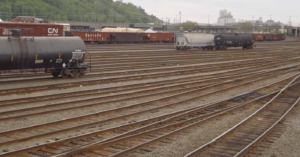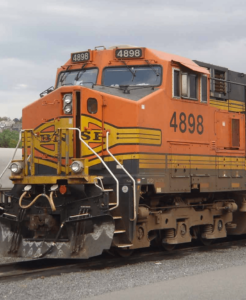BNSF Derailed in Seattle
By: Puget Soundkeeper
Puget Soundkeeper wins landmark Clean Water Act settlement.
By Chris Wilke, Puget Soundkeeper
In 1972 the U. S. Congress passed the Clean Water Act with the goal of eliminating the discharge of pollutants to the nation’s waters by 1985. That goal, unfortunately, wasn’t reached, but there have been many successes over the last four decades and marked improvement in the health of America’s waterways. Many of those successes would not have been possible without the Clean Water Act’s citizen lawsuit provision, which empowers community members and advocacy groups to use the courts to directly address and correct pollution problems in waters near and dear to them.
One recent example is the case of Puget Soundkeeper Alliance v. BNSF Railway, formerly the Burlington Northern and Santa Fe Railway and now a wholly owned subsidiary of Warren Buffet’s Berkshire Hathaway Inc. The suit was filed to oppose BNSF’s illegal discharges of polluted stormwater into Puget Sound from its Balmer Yard facility in Seattle, Washington.

Puget Sound is a deep inland sea and estuary famous for its salmon, orca whales, giant geoduck clams and tasty Dungeness crabs. Less well-known is the fact that it is also severely threatened by toxic pollution. The state of Washington has determined that stormwater runoff is the single-largest source of toxic pollution entering Puget Sound. This nasty cocktail of heavy metals, petroleum, pesticides and bacteria kills salmon, closes shell-fishing grounds and beaches and introduces highly toxic chemicals that travel through the food chain – affecting everything from fish to eagles, orcas and even people. Yet the responsible government agencies seldom enforce Washington State’s own water-quality regulations, particularly those that apply to stormwater. In fact, a recent U.S. EPA study ranked Washington – ironically nicknamed “the Evergreen State” – among the poorest of all states in enforcing the Clean Water Act.
BNSF’s Balmer Yard, Seattle’s largest railyard, is one of 1,200 industrial facilities in the state regulated under a statewide stormwater permit, issued through the National Pollution Discharge Elimination System (NPDES). The NPDES framework was introduced by the 1972 Clean Water Act as a way to regulate point-sources of pollution. Violations of the permit, therefore, are violations of the Clean Water Act, and carry a maximum penalty of $37,500 per day, per occurrence. Despite clear requirements and this provision for strong penalties, BNSF failed for years to monitor pollution responsibly. And even when it did find high levels of lead, copper, zinc, oil and turbidity in the water, it took little or no remedial action.

Enter Puget Soundkeeper Alliance. In July 2009, Soundkeeper filed its suit against BNSF under the Clean Water Act, alleging that the company was in violation of its NPDES permit. The company responded that its stormwater was actually routed to the city’s municipal water-treatment system, citing an engineering report and a “smoke test,” which determined there were no leaks in the yard’s drainage system. Digging deeper, Soundkeeper’s legal team – led by Brian Knutsen of Smith and Lowney, a Seattle law firm committed to public-interest litigation – uncovered documents related to a diesel spill at the railyard in 2001. The documents revealed how BNSF personnel described the company’s prompt deployment of oil-containment materials because they knew of the potential for transmission through the stormwater system to Elliott Bay, not to the city’s municipal system.
In August 2010, Soundkeeper amended the complaint to add claims that BNSF’s unpermitted discharges of industrial stormwater from the Balmer Yard violated the Clean Water Act on all rainy days – which, in Seattle, are frequent. To prove the point, a stormwater consultant hired by Soundkeeper performed a dye test on the 87-acre site, and watched the waters of Smith Cove in Elliott Bay turn green with the harmless dye. Convinced that stormwater did in fact discharge into the bay and Puget Sound, Federal Judge John Coughenour entered an order in August 2011 finding BNSF liable for extensive violations of the Clean Water Act. The company was guilty both of discharging industrial stormwater without a permit and of failing to implement required stormwater pollution-control measures.
The consent decree, filed Dec. 21, 2011, contains provisions for recovering damages to the environment and ensuring compliance with the Clean Water Act at the facility. It does recognize, however, that since the initial case was filed, and BNSF learned of the true discharge-direction of the railyard’s stormwater, it has taken significant actions to improve its management of stormwater on the site. The abatement measures included: developing a stormwater-pollutionprevention plan; coating roofs to minimize zinc pollution; stabilizing banks to minimize soil-erosion; and taking other actions to prevent and control spills and minimize rain contact with sources of contamination.
Under the decree, BNSF paid a total of $1.5 million to a new Puget Sound mitigation fund established by Soundkeeper and the Rose Foundation for Communities and the Environment. The foundation began accepting applications in June 2012 and will award grants to third-party groups for environmental restoration projects in Puget Sound. The federal court will retain jurisdiction over the case to enforce the decree, which includes the requirement that BNSF comply with the terms of its stormwater-discharge permit.
Soundkeeper has won more than 150 legal victories under the Clean Water Act, resulting in reduced sewage overflows, improved treatment technologies and other water-quality-protection measures, and this recent settlement is one of the largest ever involving stormwater pollution. It has given a powerful impetus to Puget Soundkeeper Alliance’s fight to eliminate the thousands of toxic-stormwater discharges into Puget Sound.
Stormwater treatment systems are now becoming more commonplace on industrial sites, both in response to Soundkeeper’s legal action and through their own initiatives. Many of these industries report dramatic declines in the discharge of heavy metals, turbidity and petroleum. The effect of the BNSF victory will be multiplied if other industries will take note, and do what many others have done already: install stormwater treatment systems, as they are required to do, to insure that on-site pollution does not spread to adjacent waters.